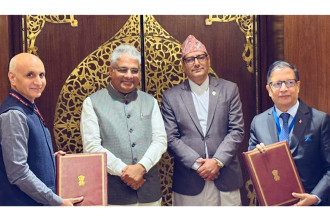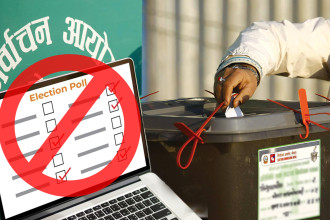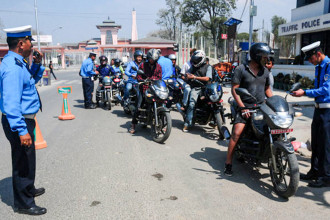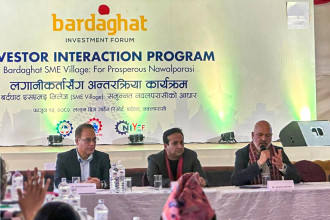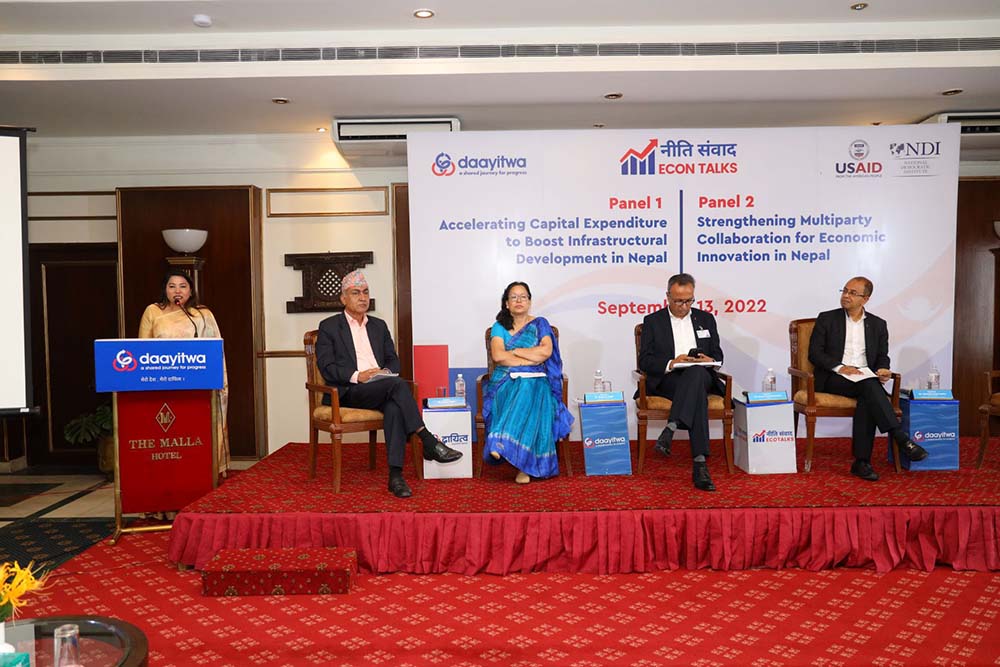
KATHMANDU: Daayitwa organised the fifth policy dialogue of the ECON Talks Series on ‘accelerating capital expenditure to boost infrastructural development in Nepal’ on Tuesday.
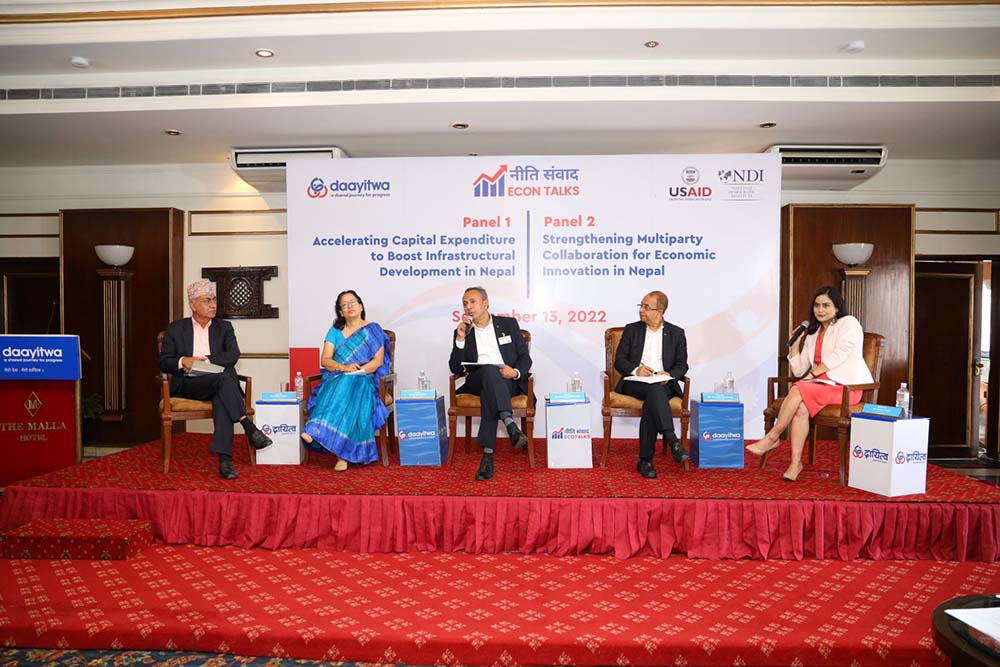 The dialogue featured Ram Kumari Jhakri, Member of Parliament and former Minister for Urban Development as the Policy Champion. The panel comprising Birendra Raj Pandey, Vice President, CN; Kewal Prasad Bhandari, Secretary, National Planning Commission; Kishore Thapa, former Secretary, Government of Nepal; and Sangeeta Singh, Urban Planning Expert, IoE, Pulchowk Campus examined the challenges and innovative ways of mobilisation of capital expenditure to boost infrastructural development in Nepal.
The dialogue featured Ram Kumari Jhakri, Member of Parliament and former Minister for Urban Development as the Policy Champion. The panel comprising Birendra Raj Pandey, Vice President, CN; Kewal Prasad Bhandari, Secretary, National Planning Commission; Kishore Thapa, former Secretary, Government of Nepal; and Sangeeta Singh, Urban Planning Expert, IoE, Pulchowk Campus examined the challenges and innovative ways of mobilisation of capital expenditure to boost infrastructural development in Nepal.
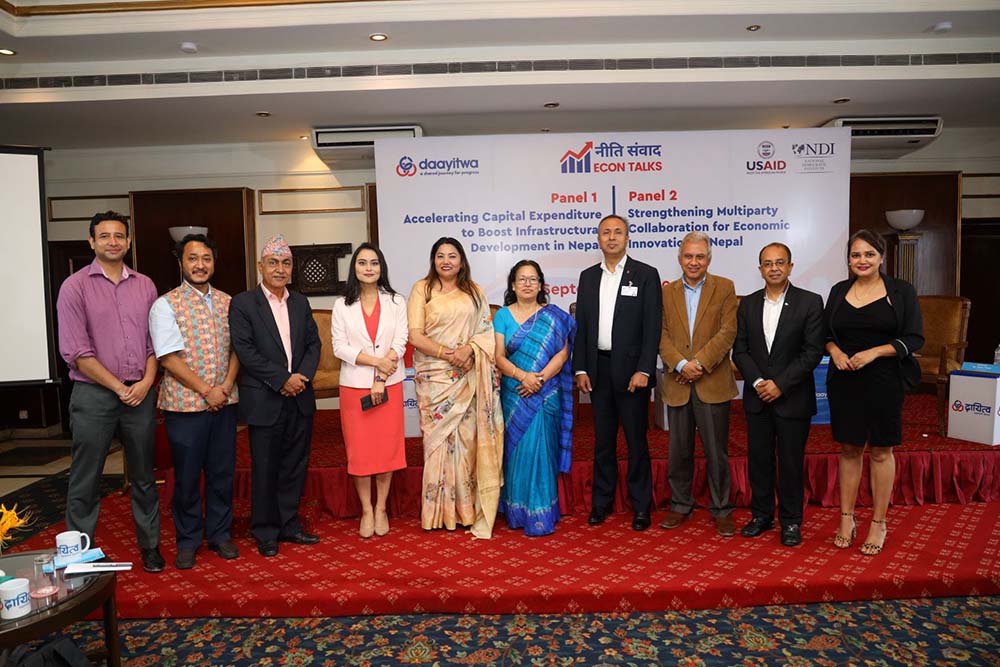 The reasons why capital expenditure is not utilised fully in Nepal include the challenges faced during project implementation, lack of coordination between the government, development partners and private sectors, inefficient work of relevant stakeholders, very rigid rules and regulations, adapting to the changing dynamics of urbanisation, need of technological advancement in infrastructural development, etc. were the major issues discussed in the dialogue.
While addressing the event, Jhakri stressed the dire need to amend the acts and regulations related to construction and infrastructure development.
“Inefficiency of the government as well as the private sector, projects not completing the project-cycle, insufficient financial resources in projects than air marked, and running to select projects only after annual budget allocation are the four main reasons why capital expenditure is not done in Nepal”, said Jhakri.
Former Secretary of the Government of Nepal, Krishna Gyawali said, “We need to have a clear vision of what kind of development we want. Only making roads and bridges is not development, let’s not concretise development. Development projects need to be inclusive and equitable.” He highlighted the necessity of close coordination and collaboration between government, development partners and the private sector to accelerate the capital expenditure to boost infrastructural development in Nepal.
The discussion was based on the policy brief aiming to support the policymakers and policy implementers to come up with pragmatic and effective models and schemes with a rich and diverse set of knowledge from the panellists. The event brought together more than 60 policymakers, CSOs, private companies, journalists and other relevant policy stakeholders. In the ECON Talks Series, the dialogues will continue to feature panels with key policy stakeholders – policy beneficiaries, policy critics and policy implementers and championship of the major takeaways by the young parliamentarian as the policy champion.
The reasons why capital expenditure is not utilised fully in Nepal include the challenges faced during project implementation, lack of coordination between the government, development partners and private sectors, inefficient work of relevant stakeholders, very rigid rules and regulations, adapting to the changing dynamics of urbanisation, need of technological advancement in infrastructural development, etc. were the major issues discussed in the dialogue.
While addressing the event, Jhakri stressed the dire need to amend the acts and regulations related to construction and infrastructure development.
“Inefficiency of the government as well as the private sector, projects not completing the project-cycle, insufficient financial resources in projects than air marked, and running to select projects only after annual budget allocation are the four main reasons why capital expenditure is not done in Nepal”, said Jhakri.
Former Secretary of the Government of Nepal, Krishna Gyawali said, “We need to have a clear vision of what kind of development we want. Only making roads and bridges is not development, let’s not concretise development. Development projects need to be inclusive and equitable.” He highlighted the necessity of close coordination and collaboration between government, development partners and the private sector to accelerate the capital expenditure to boost infrastructural development in Nepal.
The discussion was based on the policy brief aiming to support the policymakers and policy implementers to come up with pragmatic and effective models and schemes with a rich and diverse set of knowledge from the panellists. The event brought together more than 60 policymakers, CSOs, private companies, journalists and other relevant policy stakeholders. In the ECON Talks Series, the dialogues will continue to feature panels with key policy stakeholders – policy beneficiaries, policy critics and policy implementers and championship of the major takeaways by the young parliamentarian as the policy champion.
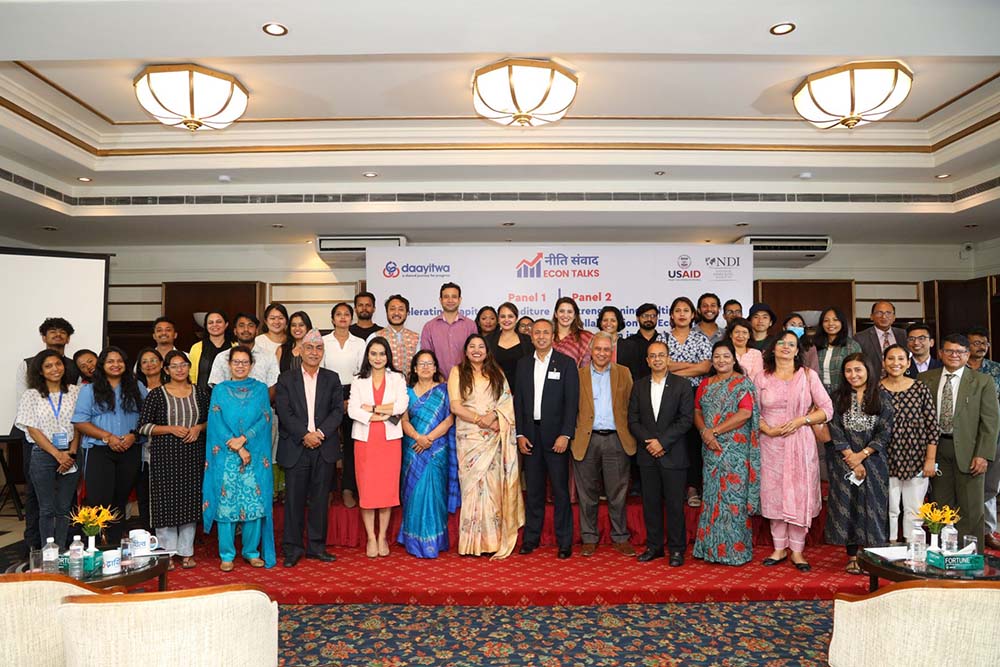 The Founder and Chairperson of Daayitwa, Pukar Malla clarified the motive for conducting the ECON Talks Series. “Economic issues are less discussed in the parliament in comparison to others, and to address this issue we planned this series to back up the parliamentarians with evidence and data to put forward the agendas related to economic development of the country. All the six policy briefs will be handed over to the respective parliamentarians with a belief that s/he will put forward the recommendations made at all the necessary platforms as the Policy Champions,” Malla added.
The fifth policy dialogue of the ECON Talks Series was moderated by the television journalist Sama Thapa. The past four dialogues of the series focused on women’s economic empowerment; youth employment; leveraging diaspora investment for the economic development of the nation; and women’s access to financial investment for the Nation’s prosperity, respectively. The last dialogue under the first part of the ECON Talks Series will focus on strengthening multi-party collaboration for economic innovation in Nepal.
Nepal is bound to witness an unavoidable economic crisis if appropriate actions are not taken on time. To solve the national economic challenges, good public policies along with result-oriented political leadership are required. Daayitwa has introduced the ‘ECON Talks’ with a mission to advocate and promote evidence-led policy decisions for economic growth of the nation. The ECON Talks Policy Dialogue Series is a collaborative effort of Daayitwa and National Democratic Institute (NDI) that aims to support the MPs to engage with stakeholders on key economic policy issues regarding Nepal’s economic development.
Daayitwa is a Nepali non-profit, non-governmental organisation that envisions an enterprising Nepal, where every individual has opportunities for a prosperous future.
Since 2013, Daayitwa has supported 141 young policy professionals from 30 countries to collaborate with 51 government organisations and 24 parliamentarians to conduct policy research projects at federal, provincial and municipal levels.
Additionally, Daayitwa has accelerated 85 growth-oriented rural enterprises (45 women-led) to embrace business innovations, access low-interest loans, and create local jobs in three provinces of Nepal.
READ ALSO:
The Founder and Chairperson of Daayitwa, Pukar Malla clarified the motive for conducting the ECON Talks Series. “Economic issues are less discussed in the parliament in comparison to others, and to address this issue we planned this series to back up the parliamentarians with evidence and data to put forward the agendas related to economic development of the country. All the six policy briefs will be handed over to the respective parliamentarians with a belief that s/he will put forward the recommendations made at all the necessary platforms as the Policy Champions,” Malla added.
The fifth policy dialogue of the ECON Talks Series was moderated by the television journalist Sama Thapa. The past four dialogues of the series focused on women’s economic empowerment; youth employment; leveraging diaspora investment for the economic development of the nation; and women’s access to financial investment for the Nation’s prosperity, respectively. The last dialogue under the first part of the ECON Talks Series will focus on strengthening multi-party collaboration for economic innovation in Nepal.
Nepal is bound to witness an unavoidable economic crisis if appropriate actions are not taken on time. To solve the national economic challenges, good public policies along with result-oriented political leadership are required. Daayitwa has introduced the ‘ECON Talks’ with a mission to advocate and promote evidence-led policy decisions for economic growth of the nation. The ECON Talks Policy Dialogue Series is a collaborative effort of Daayitwa and National Democratic Institute (NDI) that aims to support the MPs to engage with stakeholders on key economic policy issues regarding Nepal’s economic development.
Daayitwa is a Nepali non-profit, non-governmental organisation that envisions an enterprising Nepal, where every individual has opportunities for a prosperous future.
Since 2013, Daayitwa has supported 141 young policy professionals from 30 countries to collaborate with 51 government organisations and 24 parliamentarians to conduct policy research projects at federal, provincial and municipal levels.
Additionally, Daayitwa has accelerated 85 growth-oriented rural enterprises (45 women-led) to embrace business innovations, access low-interest loans, and create local jobs in three provinces of Nepal.
READ ALSO:
 The dialogue featured Ram Kumari Jhakri, Member of Parliament and former Minister for Urban Development as the Policy Champion. The panel comprising Birendra Raj Pandey, Vice President, CN; Kewal Prasad Bhandari, Secretary, National Planning Commission; Kishore Thapa, former Secretary, Government of Nepal; and Sangeeta Singh, Urban Planning Expert, IoE, Pulchowk Campus examined the challenges and innovative ways of mobilisation of capital expenditure to boost infrastructural development in Nepal.
The dialogue featured Ram Kumari Jhakri, Member of Parliament and former Minister for Urban Development as the Policy Champion. The panel comprising Birendra Raj Pandey, Vice President, CN; Kewal Prasad Bhandari, Secretary, National Planning Commission; Kishore Thapa, former Secretary, Government of Nepal; and Sangeeta Singh, Urban Planning Expert, IoE, Pulchowk Campus examined the challenges and innovative ways of mobilisation of capital expenditure to boost infrastructural development in Nepal.
 The reasons why capital expenditure is not utilised fully in Nepal include the challenges faced during project implementation, lack of coordination between the government, development partners and private sectors, inefficient work of relevant stakeholders, very rigid rules and regulations, adapting to the changing dynamics of urbanisation, need of technological advancement in infrastructural development, etc. were the major issues discussed in the dialogue.
While addressing the event, Jhakri stressed the dire need to amend the acts and regulations related to construction and infrastructure development.
“Inefficiency of the government as well as the private sector, projects not completing the project-cycle, insufficient financial resources in projects than air marked, and running to select projects only after annual budget allocation are the four main reasons why capital expenditure is not done in Nepal”, said Jhakri.
Former Secretary of the Government of Nepal, Krishna Gyawali said, “We need to have a clear vision of what kind of development we want. Only making roads and bridges is not development, let’s not concretise development. Development projects need to be inclusive and equitable.” He highlighted the necessity of close coordination and collaboration between government, development partners and the private sector to accelerate the capital expenditure to boost infrastructural development in Nepal.
The discussion was based on the policy brief aiming to support the policymakers and policy implementers to come up with pragmatic and effective models and schemes with a rich and diverse set of knowledge from the panellists. The event brought together more than 60 policymakers, CSOs, private companies, journalists and other relevant policy stakeholders. In the ECON Talks Series, the dialogues will continue to feature panels with key policy stakeholders – policy beneficiaries, policy critics and policy implementers and championship of the major takeaways by the young parliamentarian as the policy champion.
The reasons why capital expenditure is not utilised fully in Nepal include the challenges faced during project implementation, lack of coordination between the government, development partners and private sectors, inefficient work of relevant stakeholders, very rigid rules and regulations, adapting to the changing dynamics of urbanisation, need of technological advancement in infrastructural development, etc. were the major issues discussed in the dialogue.
While addressing the event, Jhakri stressed the dire need to amend the acts and regulations related to construction and infrastructure development.
“Inefficiency of the government as well as the private sector, projects not completing the project-cycle, insufficient financial resources in projects than air marked, and running to select projects only after annual budget allocation are the four main reasons why capital expenditure is not done in Nepal”, said Jhakri.
Former Secretary of the Government of Nepal, Krishna Gyawali said, “We need to have a clear vision of what kind of development we want. Only making roads and bridges is not development, let’s not concretise development. Development projects need to be inclusive and equitable.” He highlighted the necessity of close coordination and collaboration between government, development partners and the private sector to accelerate the capital expenditure to boost infrastructural development in Nepal.
The discussion was based on the policy brief aiming to support the policymakers and policy implementers to come up with pragmatic and effective models and schemes with a rich and diverse set of knowledge from the panellists. The event brought together more than 60 policymakers, CSOs, private companies, journalists and other relevant policy stakeholders. In the ECON Talks Series, the dialogues will continue to feature panels with key policy stakeholders – policy beneficiaries, policy critics and policy implementers and championship of the major takeaways by the young parliamentarian as the policy champion.
 The Founder and Chairperson of Daayitwa, Pukar Malla clarified the motive for conducting the ECON Talks Series. “Economic issues are less discussed in the parliament in comparison to others, and to address this issue we planned this series to back up the parliamentarians with evidence and data to put forward the agendas related to economic development of the country. All the six policy briefs will be handed over to the respective parliamentarians with a belief that s/he will put forward the recommendations made at all the necessary platforms as the Policy Champions,” Malla added.
The fifth policy dialogue of the ECON Talks Series was moderated by the television journalist Sama Thapa. The past four dialogues of the series focused on women’s economic empowerment; youth employment; leveraging diaspora investment for the economic development of the nation; and women’s access to financial investment for the Nation’s prosperity, respectively. The last dialogue under the first part of the ECON Talks Series will focus on strengthening multi-party collaboration for economic innovation in Nepal.
Nepal is bound to witness an unavoidable economic crisis if appropriate actions are not taken on time. To solve the national economic challenges, good public policies along with result-oriented political leadership are required. Daayitwa has introduced the ‘ECON Talks’ with a mission to advocate and promote evidence-led policy decisions for economic growth of the nation. The ECON Talks Policy Dialogue Series is a collaborative effort of Daayitwa and National Democratic Institute (NDI) that aims to support the MPs to engage with stakeholders on key economic policy issues regarding Nepal’s economic development.
Daayitwa is a Nepali non-profit, non-governmental organisation that envisions an enterprising Nepal, where every individual has opportunities for a prosperous future.
Since 2013, Daayitwa has supported 141 young policy professionals from 30 countries to collaborate with 51 government organisations and 24 parliamentarians to conduct policy research projects at federal, provincial and municipal levels.
Additionally, Daayitwa has accelerated 85 growth-oriented rural enterprises (45 women-led) to embrace business innovations, access low-interest loans, and create local jobs in three provinces of Nepal.
READ ALSO:
The Founder and Chairperson of Daayitwa, Pukar Malla clarified the motive for conducting the ECON Talks Series. “Economic issues are less discussed in the parliament in comparison to others, and to address this issue we planned this series to back up the parliamentarians with evidence and data to put forward the agendas related to economic development of the country. All the six policy briefs will be handed over to the respective parliamentarians with a belief that s/he will put forward the recommendations made at all the necessary platforms as the Policy Champions,” Malla added.
The fifth policy dialogue of the ECON Talks Series was moderated by the television journalist Sama Thapa. The past four dialogues of the series focused on women’s economic empowerment; youth employment; leveraging diaspora investment for the economic development of the nation; and women’s access to financial investment for the Nation’s prosperity, respectively. The last dialogue under the first part of the ECON Talks Series will focus on strengthening multi-party collaboration for economic innovation in Nepal.
Nepal is bound to witness an unavoidable economic crisis if appropriate actions are not taken on time. To solve the national economic challenges, good public policies along with result-oriented political leadership are required. Daayitwa has introduced the ‘ECON Talks’ with a mission to advocate and promote evidence-led policy decisions for economic growth of the nation. The ECON Talks Policy Dialogue Series is a collaborative effort of Daayitwa and National Democratic Institute (NDI) that aims to support the MPs to engage with stakeholders on key economic policy issues regarding Nepal’s economic development.
Daayitwa is a Nepali non-profit, non-governmental organisation that envisions an enterprising Nepal, where every individual has opportunities for a prosperous future.
Since 2013, Daayitwa has supported 141 young policy professionals from 30 countries to collaborate with 51 government organisations and 24 parliamentarians to conduct policy research projects at federal, provincial and municipal levels.
Additionally, Daayitwa has accelerated 85 growth-oriented rural enterprises (45 women-led) to embrace business innovations, access low-interest loans, and create local jobs in three provinces of Nepal.
READ ALSO:
- Daayitwa recommends innovative ideas to improve women’s access to financial investment
- Daayitwa’s third policy dialogue recommends ways to leverage diaspora investment
- Daayitwa’s ECO Talks backs MPs with evidence on economic affairs
- Daayitwa organises Economic Governance and Leadership Development training
Published Date: September 15, 2022, 12:00 am
Post Comment
E-Magazine
RELATED B360 National


